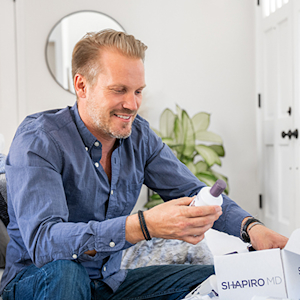Pumpkin Seed Oil For Hair Loss: Does It Really Work?
2022-11-22
Summary
- Pumpkin seed oil is a plant-based ingredient that may be an effective option for people who struggle with hair loss.
- Research shows that pumpkin seed oil can protect the scalp by limiting the impact of dihydrotestosterone (DHT), which causes thinner and more brittle hair growth and is the primary driver of hair loss in most men and women.
- Pumpkin seed oil can be used topically or taken as an oral supplement.
From granola to body lotions, pumpkin seed oil is one of many plant-based ingredients that has gained popularity for its broad wellness benefits in recent years.
Although the body of research is growing, pumpkin seed oil’s drawcard may be its ability to help prevent hair loss when used regularly, as in shampoos or conditioners. It’s easy to use, all-natural, and has been shown to impact the primary hair loss trigger in most men and women – dihydrotestosterone (DHT).
But is it worth the hype?
We’ve put this article together to help you understand the benefits of pumpkin seed oil, how to use it, and any risk factors to be aware of.
What Is Hair Loss and Why Does It Happen?
Before we take a closer look at how pumpkin seed oil may help prevent hair loss, it’s important to know a bit more about the condition.
Hair loss affects 35 million men and 21 million women in their lifetime. About 30-50% of men will experience male pattern baldness—also known as androgenic alopecia—by the time they turn 50. This type of hair loss is largely hereditary, determined by genetics. It is the most common cause of hair loss in both men and women.
For women, hair loss often starts in our 40s and 50s with hormonal changes associated with menopause. It also frequently affects those who wear their hair in certain styles, like tight ponytails, cornrows, braids, and buns that pull at the hair roots. Hair loss that results from wearing tight hairstyles is usually temporary—for example, if a person stops wearing their hair in tight braids, it can regrow.
Women who have recently had children may also experience temporary postpartum hair loss as well.
There are a number of reasons why you may suffer from hair loss, including:
- Genetics (male pattern hair loss, or androgenic alopecia)
- Hormonal changes
- Medical conditions like alopecia areata, scalp infections, and pulling disorders (trichotillomania)
- Chronic stress
Hair loss can be temporary or permanent, often resulting in baldness or patchiness.

What Is Pumpkin Seed Oil?
Pumpkin seed oil has emerged as a potential treatment for hair loss because it has shown promising signs of promoting hair growth and stopping the primary hair loss hormone in most men and women, called DHT.
This oil is extracted from pumpkin seeds. It’s commonly used as a cooking ingredient for its bounty of essential fatty acids, vitamins, and minerals.
Does Pumpkin Seed Oil Help with Hair Loss?
Many hair loss treatments work by protecting your hair follicles from a hormone called dihydrotestosterone (DHT).
This hormone is part of the androgen family, like testosterone, and primarily contributes to male sex characteristics like a deeper voice and body hair.
Unfortunately, DHT can also make you lose hair faster and earlier because it shrinks hair follicles. This causes hairs to grow thin and brittle.
DHT blocking ingredients and medications that protect the scalp and follicles from the harmful effects of DHT can reduce this negative impact and help to stimulate hair growth.
Common DHT-blocking hair treatments include:
- Finasteride
- Saw Palmetto
- Dutasteride
Pumpkin oil may be able to offer protection by the same mechanism: limiting your body’s ability to produce DHT, or limiting DHT’s effects on follicles.
Although more research is needed to reach definitive conclusions with pumpkin oil for hair loss, many small-scale studies have found promising results regarding pumpkin seed oil’s ability to prevent hair loss.
What Does The Science Say about Pumpkin Seed Oil? Research on the effectiveness of using pumpkin seed oil to promote healthier hair growth has shown positive results. In one study, male patients were given pumpkin seed oil supplements over the course of 24 weeks. Changes in the scalp were monitored in terms of hair thickness and hair count. At the end of the trial, the treatment group had a 40% increase in hair count compared to the placebo group. No adverse effects were noted in either group.
Can you use pumpkin seed oil for hair growth?
Research suggests that pumpkin seed oil may also be used to promote hair growth in people who suffer from male or female pattern hair loss or baldness.
Pumpkin seed oil may help prevent DHT”s affects on follicles, stopping them from shrinking and causing hair to become thinner. It also appears to stimulate blood flow to the scalp, which can help hair grow too.

What Are the Best Forms of Pumpkin Seed Oil to Promote Hair Growth?
A number of pumpkin seed oil applications are available. Let’s take a look at two of the common approaches that are used as hair loss treatments.
Topical pumpkin seed oil
Pumpkin seed oil can be used as a topical hair growth treatment by applying it directly to the scalp with leave-in solutions, shampoos, or conditioners.
When applied to the scalp, your skin absorbs pumpkin seed oil quickly, which may help it go to work at the follicle level.
Most raw pumpkin seed oil should be refrigerated once it has been opened. When stored properly, the oil may last up to two years.
What Can I Mix with Pumpkin Seed Oil to Grow My Hair? Pumpkin seed oil can generally be mixed with any other essential oils that promote healthy hair and faster growth. This may help speed up the growth cycle and show visible results faster. A few well-known oils with hair-improving effects that can be mixed with pumpkin seed oil include:
- Coconut oil
- Argan oil
- Avocado oil
- Vitamin E oil
Oral pumpkin seed oil supplements
Another popular way to use pumpkin seed oil is by taking oral supplements. These are usually sold in gel capsules.
A typical pumpkin seed oil supplement dose is around 1,000 mg.
Depending on product directions, one to two of these capsules can be taken up to three times daily after meals.
Even though more research is needed to prove the effectiveness of pumpkin seed oil supplements for promoting hair growth, ingesting it regularly is unlikely to be harmful, and there are reasons to believe it can be beneficial. In fact, pumpkin seed oil has been associated with a number of health benefits, including:
- Lowering the risk of developing certain types of cancers.
- Supporting prostate and bladder health
- Improving heart health
- Helping to improve quality of sleep
It’s important to note that these supplements aren’t FDA-approved, nor are medical claims.
It’s also recommended you speak to your health care provider beforehand to avoid unexpected risks to your health. They’ll be able to help you determine if this is the right treatment option for your condition and recommend a dosage regime.
Which Hair Loss Treatments are FDA-Approved? Oral finasteride (brand-name Propecia®) and topical minoxidil (brand-name Rogaine®) are the only two FDA-approved hair loss treatments for male and female pattern baldness in the U.S. The regulatory body has also approved the oral medication Olumiant® (baricitinib) for treating severe alopecia.

Who Should Use Pumpkin Seed Oil?
Pumpkin seed oil may be beneficial for any person who suffers from hair loss and male pattern baldness. It may be an effective treatment option for people who want to grow thicker-looking and healthier hair.
How do you use pumpkin seed oil?
How you incorporate pumpkin seed oil into your hair care routine will depend on the formula you decide to use.
If you’re using a serum or hair oil, apply the product straight to your scalp after washing your hair. Then massage it into the scalp.
You can also use a pumpkin seed oil serum to repair dry or damaged hair by applying the product to split or damaged ends.
How Long Does It Take for Pumpkin Seed Oil to Work?
The effectiveness of any hair loss treatment will depend on the cause and severity of the condition.
Most treatments, including pumpkin seed oil, may take between three to six months to work and restore hair health.
If your hair loss is caused by nutritional deficiencies, it may take even longer for proper treatment to correct these and restore balance to the body.
Can Pumpkin Seed Oil Cause Side Effects?
Pumpkin seed oil may cause an allergic reaction in people who are sensitive to its natural or raw form.
If you experience any of the following symptoms, stop using pumpkin seed oil immediately:
- Itchy, red, and flaking scalp or areas on the body
- Rashes or red bumps appearing on the scalp or body
- Wheezing
- Swollen eyes, lips, mouth, or throat
Severe symptoms like difficulty breathing or feeling dizzy require immediate medical attention.
It’s always recommended to do a patch test on a small area of the body before using it on your scalp.
Apply a small amount of the oil on the back of your hand or arm and wait 48 hours. If no reaction occurs, the product is generally safe for use.
Where Can I Learn More About Pumpkin Seed Oil and Hair Loss?
Hair loss can be incredibly frustrating.
Luckily, Shapiro MD can help.
Our hair growth experts are here to help you get to the root of your condition, as well as recommend the right treatment options for you. With natural and prescription medications (all done online!), it's easier than ever to restore the look of voluminous hair.
Learn more about our patented formulas and unique natural hair formulas now.
Sources
https://www.aad.org/public/diseases/hair-loss/insider/new-moms
https://www.ncbi.nlm.nih.gov/pmc/articles/PMC4017725/
https://www.ncbi.nlm.nih.gov/pmc/articles/PMC6823528/
https://www.sciencedirect.com/science/article/abs/pii/S0963996909000453
https://onlinelibrary.wiley.com/doi/abs/10.1002/ejlt.200700105
https://pubmed.ncbi.nlm.nih.gov/15510909/
https://onlinelibrary.wiley.com/doi/abs/10.1002/ejlt.200700105
https://www.aad.org/public/diseases/hair-loss/treatment/diagnosis-treat


